

UK plastic surgery statistics: breasts up, ears down. Plastic surgery is big business in the UK - and despite the recession, it's a growing one.
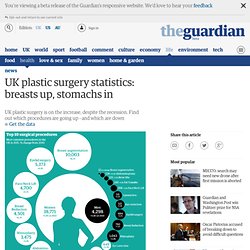
Breast augmentations are still by far the most popular cosmetic surgery procedure for women and have risen year on year - although these figures take no account of the breast implant scandal, which recently led plastic surgeons to call for a ban on advertising it. Plastic surgery statistics in the UK show a record number of male 'tummy tuck' operations as the rise in demand outstrips that for all other procedures - including women's breast enlargement.
Figures published by the British Association of Aesthetic Plastic Surgeons (BAAPs) - that really is its acronym - showed abdominoplasty operations grew by 15%, while overall male cosmetic surgery grew by 5.6%. The association represents one in three plastic surgeons. The figures are only surgical procedures. We're certainly not at US levels though. Women Men. Response: Sentencing of young adults should take their maturity into account. Your report on the Royal Society paper Neuroscience and the Law says "scientific understanding of the brain has advanced in recent decades", with potentially momentous implications for the practice of law (Age of criminal responsibility is too low, say brain scientists, 14 December).
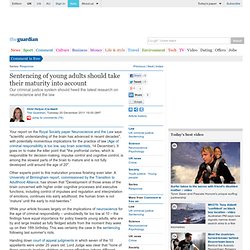
It goes on to make the killer point that "the prefrontal cortex, which is responsible for decision-making, impulse control and cognitive control, is among the slowest parts of the brain to mature and is not fully developed until around the age of 20". Other experts point to this maturation process finishing even later. A University of Birmingham report, commissioned by the Transition to Adulthood Alliance, has shown that "Development of those areas of the brain concerned with higher order cognitive processes and executive functions, including control of impulses and regulation and interpretation of emotions, continues into early adulthood; the human brain is not 'mature' until the early to mid-twenties.
" Friedrich Kittler and the rise of the machine. How biometric IDs like iris scans will help developing countries fight corruption and bust fake workers. Photograph by Dibyangshu Sarkar AFP/Getty Images.
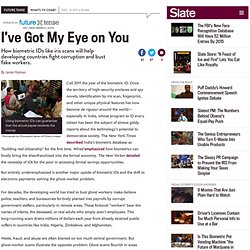
Call 2011 the year of the biometric ID. Once the territory of high-security enclaves and spy novels, identification by iris scan, fingerprint, and other unique physical features has now become de rigueur around the world—especially in India, whose program to ID every citizen has been the subject of almost giddy reports about the technology’s potential to democratize society. Mayo v. Prometheus and the fight over medical patents. Photograph by Jupiterimages/Thinkstock.
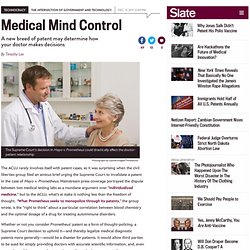
The ACLU rarely involves itself with patent cases, so it was surprising when the civil liberties group filed an amicus brief urging the Supreme Court to invalidate a patent in the case of Mayo v. Uber car service: Exposing the idiocy of American city taxi regulations. Photograph by Mark Von Holden/Getty Images for Ford.
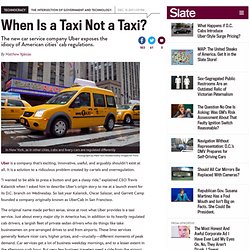
Uber is a company that’s exciting, innovative, useful, and arguably shouldn’t exist at all. It is a solution to a ridiculous problem created by cartels and overregulation. “I wanted to be able to press a button and get a classy ride,” explained CEO Travis Kalanick when I asked him to describe Uber’s origin story to me at a launch event for its D.C. branch on Wednesday. So last year Kalanick, Oscar Salazar, and Garrett Camp founded a company originally known as UberCab in San Francisco. The original name made perfect sense, since at root what Uber provides is a taxi service. These are two fairly distinct market segments. Cameron's Inevitable "Veto" Anglophobia is on the march in Europe today after Britain "vetoed" a full EU treaty change that would require all member states to submit their budgets to Brussels for approval.
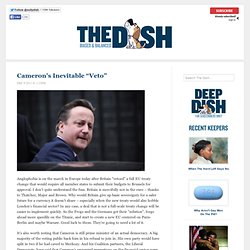
I don't quite understand the fuss. Britain is mercifully not in the euro – thanks to Thatcher, Major and Brown. The riots and policing's sacred cow. 'Stop-and-search is the focus of the frustrations and anger that many of these young people feel.' Photograph: Jason Alden / Rex Features Much of the early debate engendered by Reading the Riots has focused on the police.
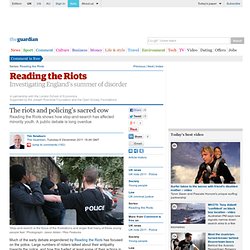
Large numbers of rioters talked about their antipathy towards the police, and how this fuelled at least some of their actions in early August. Technology and the vanishing job market - latimes.com. The stubbornly high unemployment rate has left policymakers wondering whether there's something more at work than just an unusually steep recession.
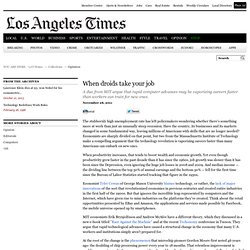
Have the country, its businesses and its markets changed in some fundamental way, leaving millions of Americans with skills that are no longer needed? Economists are sharply divided on that point, but two from the Massachusetts Institute of Technology make a compelling argument that the technology revolution is vaporizing careers faster than many Americans can embark on new ones.
When productivity increases, that tends to boost wealth and economic growth. Yet even though productivity grew faster in the past decade than it has since the 1960s, job growth was slower than it has been since the Depression, even ignoring the huge job losses in 2008 and 2009. At the root of the change is the phenomenon that microchip pioneer Gordon Moore first noted 46 years ago: the doubling of chip processing power every year to 18 months. A manifesto for the Occupy movement - latimes.com. Dear Occupy Wall Street: We get it — you're mad as hell and you're not going to take it anymore.
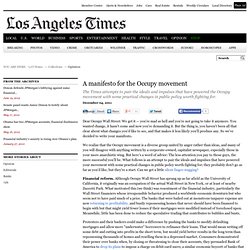
You wanted change, it hasn't come and now you're demanding it. But the thing is, you haven't been all that clear about what changes you'd like to see, and that makes it less likely you'll produce any. So we've decided to write your manifesto. Working Moms Multitask More Than Dads — and Like It Less. Women — especially working mothers — are the ultimate multitaskers, but they’re not too happy about it.
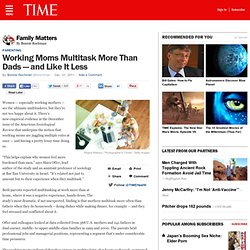
There’s now empirical evidence in the December issue of the American Sociological Review that underpins the notion that working moms are juggling multiple roles at once — and having a pretty lousy time doing so. “This helps explain why women feel more burdened than men,” says Shira Offer, lead author of the study and an assistant professor of sociology at Bar Ilan University in Israel. Frenchman ordered to pay wife damages for lack of sex. Jailed rioters need help to turn their lives around, says Boris Johnson. London's mayor, Boris Johnson, has said the huge number of people jailed after the riots cannot be abandoned in prison, and must be helped to turn their lives around.
Testifying before the home affairs committee investigation into last month's riots, which blighted 22 out of the capital's 32 boroughs, Johnson said the cost to London alone was around £75m. He agreed with the justice secretary, Ken Clarke, who wrote a Guardian article blaming a "feral underclass" which a broken prison system had failed to rehabilitate. Johnson told MPs that with more than 2,000 people arrested and more than 1,000 convicted in London alone, it was vital that in prison everything was done to help those convicted turn their lives around.
Childcare costs put parents in debt, survey concludes. 7 September 2011Last updated at 04:04 Parents pay more than £5,000 a year for 25 hours of nursery care for a child under two, research says Nearly a quarter of UK parents questioned in a survey by the Daycare Trust and Save the Children say the cost of childcare has put them in debt. The survey of 4,359 parents found 58% had cut spending on other essentials like clothing, heating and other bills.
Nearly two-thirds said they could not afford not to work, but struggled to pay for childcare.